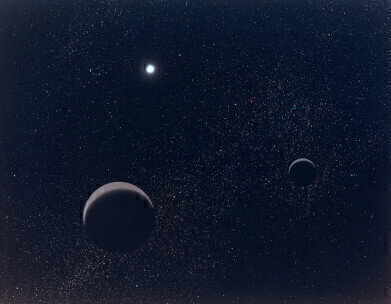News & Views
Why Are Pictures of Pluto All Subpar?
Jul 12 2015
Despite the fact that space scientists have been studying Pluto for decades, visual details on the dwarf planet remain seriously sketchy. So much so that high quality photographs of Pluto simply don’t exist, and any that do are no more a few pixels in size. In fact, the highest quality image was snapped way back in 1994 with the Hubble Space Telescope! At the time scientists blew up the pixelated surface maps and described the surface as "a complex-looking and variegated world with white, dark-orange and charcoal-black terrain."
Considering the cutting edge technology and state-of-the-art equipment currently available to scientists, the lack of quality seems puzzling? So why aren’t there any decent photos of Pluto out there? Read on as we explore what it is that makes the trans-Neptunian object so elusive.
A small planet far, far away
Put simply, Pluto’s size and distance from the Earth play a key role in its illusiveness. It orbits 7.5 billion kilometres from Earth and has a diameter just 1,430 miles. That makes it just two-thirds of the size of our moon.
NASA set to shake things up
While Pluto has managed to retain its mystery up until now, NASA has other plans. The agency’s New Horizons spacecraft is currently on a mission to capture high quality images of the dwarf planet, as well as its moons and surrounding celestial objects. The ultra-advanced craft clocks up around 1 million miles a day and is on a mission to snap the world’s first high quality pictures of Pluto’s surface.
Dr. Marc Buie, a staff scientist at the Southwest Research Institute explains, "Once we get up close, we'll be able to resolve the geology. We'll see craters if they exist. We'll see all the tectonic and weathering patterns on the surface. Everything that's sculpted the landforms on Pluto and [Pluto's moon] Caron is going to be revealed to us for the first time."
When the mission wraps up later this month Buie maintains that New Horizons will have captured a "complete global map of the illuminated part of the surface of Pluto to 1 kilometre resolution or better." The photographs will boast resolutions as high as 100m which will offer scientists fascinating insight into the current state of the planet’s surface, as well as what it may have looked like in the past.
Interested in uncovering the mysteries of outer space? This article titled the ‘62nd ASMS Conference on Mass Spectrometry and Allied Topics 15-19 June at the Baltimore Convention Center, Baltimore, Maryland USA’ looks at key highlights from the event, including the ‘Spaceflight MASS Spectrometry 1963 – 2018’ exhibition.
Images sourced via Flickr Creative Commons. Credits: Lunar and Planetary Institute
Digital Edition
LMUK 49.7 Nov 2024
November 2024
News - Research & Events News - News & Views Articles - They’re burning the labs... Spotlight Features - Incubators, Freezers & Cooling Equipment - Pumps, Valves & Liquid Hand...
View all digital editions
Events
Nov 18 2024 Shanghai, China
Nov 20 2024 Karachi, Pakistan
Nov 27 2024 Istanbul, Turkey
Jan 22 2025 Tokyo, Japan
Jan 22 2025 Birmingham, UK




.jpg)














